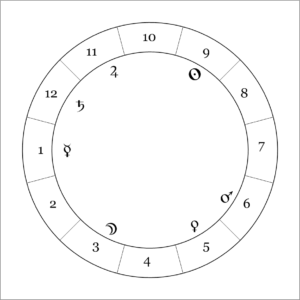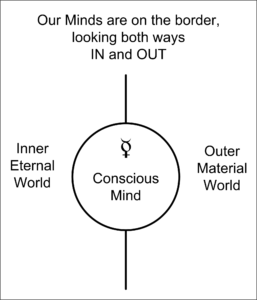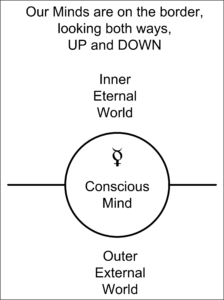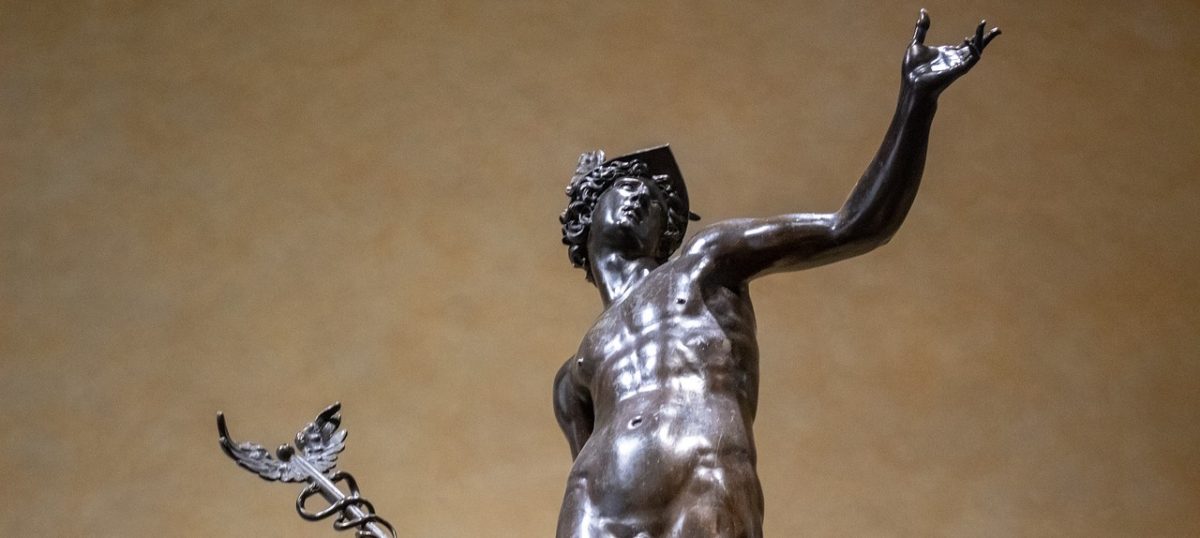On the Border Between Worlds
I am finishing up the first full draft of my book on the philosophy of astrology; the working title is, The Divine Dimension: The Spiritual Roots of Western Astrology. This is my attempt to go back to the roots of our western astrology in the Greek Platonist tradition, and think through the underlying philosophy and worldview.
There is a single core issue that is an underlying theme of our western philosophical tradition, reaching from the early Greek era, what we now refer to as the PreSocratics, all the way through to the world we live in today. The core issue is, the Mind/Matter dichotomy. Basically, we have a Mind in here and a world of Matter out there, and we need a way of thinking about how they connect.
In the Platonist worldview we are living in two worlds or dimensions at once, eternal and temporal. We access the eternal dimension by looking inward, within our minds, and we access the temporal, physical dimension by looking outward, sensing and perceiving the material world. Inner/mental and outer/physical really are two distinct dimensions of experience. Both are part of being human, and you can’t reduce either of them down to the other without leaving out a whole domain of experience. You can’t collapse inner experience down to an epiphenomenon or side effect of matter, and you can’t collapse outer sensory experience down to an effect of the inner, the Mind.
These are two dimensions of our full human experience; and they are related, they mirror each other, they are connected.
Platonism approaches the situation by making the eternal dimension primary and viewing the temporal world of matter as secondary and derived. Platonists view knowledge of the world as inherent in our minds and ultimately retrieved from within. The Aristotelian side of the Greek tradition starts in the other direction, with our deriving our knowledge of the world from outer experience, and abstracting from that to move to inner knowledge. They are trying to get at the connection from opposite directions, and both of them have valid points to make.
In this post I want to try looking at this from a somewhat different perspective, focusing on the role of the planet Mercury.
On the Border
I want to approach this from the starting point of our full human experience.
As humans we never experience mind and matter separately. We are aware mental beings in physical material bodies.
Our starting point in experience is Consciousness-Experiencing-Mind-And-Matter. We always start from a perceptual point, and we can choose to look outwards and perceive the material world, or we can choose to look inwards and perceive a mental world. Our conscious perception is at the boundary of inner and outer, mind and matter, and we can turn our consciousness in either direction.
There is mind, there is matter – and there is a third point, the consciousness at the interface between the two.
Our mind is on the border between two worlds.
We can be immersed in the external world. We can be immersed in the internal world. When we are externally focused we are on the border of our mind looking out. When we are turned inward we are on that same border but looking inward.
Our mind straddles two worlds. And, the planet that represents the straddling, the interface, is Mercury.
We are not on the inside looking out; We are on the border looking both in and out.
In astrology the planet Mercury is the bridge, the connector. What links the world of mind and matter is THE CONSCIOUS PERCEIVER.
One other very important point, that I think is a key to our human consciousness:
The link between inner and outer realities is our conscious minds.
To help think about this I want to approach it with a few graphic images.
The Joys of the Planets
This is a diagram of the houses showing the Joys of the Planets. The three diurnal planets, Sun, Jupiter and Saturn, are all above the horizon. The three nocturnal planets, Moon, Venus and Mars, are all below the horizon.

Mercury is at the horizon, on the border.
You can think of above the horizon as being focused outward into the daylight world, and being below the horizon as being focused inward, into our night world which includes (but is not limited to) our dreams.
Inside and Out
Here is another way of looking at our worlds of experience. Picture the borderline of our consciousness as the vertical line. Left of the line is our inner experience, what we call our Mind, and right of the line is our outer sensory experience.

Mercury is at the border here, between inner and outer experience.
We have our minds bridging the two worlds, and living in both.
A very important point here is that both inner and outer are domains of shared experience. Our minds are open on the outside, our minds are equally open on the inside.
On the outside we are open to other living beings. On the inside we are also open to other living intelligent beings, which is what the Greeks mean when they talk about gods and daemons.
Get that point very clear in your mind – our minds are open on the inside.
Above and Below
Here is another model for the same experience, but oriented differently.

In the cosmos of astrology we as human beings are between the heavens and the earth. The eternal world is above us, the physical world is below us, and the planets of astrology are mediating between the two.
When you look at the late Platonists, especially Plotinus, when they talk about different levels of being, and ascending in consciousness to a union with the One, it is obvious that they are not sketching out a theoretical model. They are describing a lived experience.
And – very important here – I am convinced that, when we read about the Greek gods, the gods of astrology, those descriptions of the gods are taken from experience also.
Open on the Inside
It is critical to emphasize that our minds are open on the inside.
That is so very different from how we usually think of ourselves today. We think of our “inner” minds as being completely private, and that any images or voices we perceive within us our just our imagination, our own minds at work.
I really do not think it is that simple. We are open to living influences on the inside.
If you have ever done any work with “visualizing” a god or an interior landscape – which I have – you know that you can reach a point where it just doesn’t feel like you’re imagining things anymore. The quality changes. There is an uncanny sense of realness to the experience, and there can be the experience of confronting another intelligent being that most definitely does not feel like they are just part of my own mind. There is an other-ness to the experience.
Similarly, for those who have a regular prayer life – which I do – you can get an overwhelming sense that you are confronting another Person, and that your prayer is not a monologue, but a true dialogue.
Or, you can have an experience that a thought or a picture comes into your mind seemingly from out of nowhere. It is worth seriously considering that some of what goes through our minds does not originate from us.
Mercury and Astrology
Astrology is all about mapping the correspondences of the heavens above us with our lives and the earth we live in. In the context we are discussing here, this is a metaphor for mapping the order of the inner world as it works itself out in the outer world. And remember, the inner world does not originate in our subjective minds; it is far larger than that.
As above, so below. As within, so without.
And, the key to awareness of the worlds is Mercury, our conscious minds.
Final Points
I want to conclude this essay with some points for reflection.
Our minds are not isolated, but connected to the world we live in, inside and out. There is no split or separation between inner and outer worlds. Inner and outer are connected, and our conscious minds do the connecting.
There are two dimensions to our experience, two distinct inter-connected worlds. To be fully human and fully awake we need both. We need to be aware within and without.
Our minds are open on the inside to influence by intelligent entities. The Greeks called them gods and daemons; the Christian tradition re-named them angels. Some modern psychology reframes them and calls them archetypes. Whatever we call them, they are real, they are intelligent, they are powerful, and they influence our life for good and evil.
The up side of this influence is that we are guided and supported. The down side, where caution is needed is that we are being influenced by all varieties of beings, some helpful and some harmful. There is a need for self-awareness, and for what the church calls discernment of spirits. Regardless of how we are influenced there is always the need for rational choice and conscious decision. Feeling we are inspired by a god or angel does not absolve us of conscious resposibility. Hitler was sure he was following the guidance of a god and fulfilling a divine destiny.
Throughout the Greek tradition, both the main Platonist stream, and the complementary viewpoint of Aristotle, the pivot point, the key piece, that which makes us uniquely human, is our reason. This stays central at all times, throughout the tradition. This is the single point I would emphasize the most here – the responsibility for us to use reason and self-aware choice.
We get to choose how we align ourselves. We are responsible for our choice, and we pay the consequences, in this life and in the next.
As consciously aware, rational and thinking human beings, we are the integration point between innner and outer worlds. Our conscious minds complete the circuit connecting the two worlds. That is our role in the overall pattern of the cosmos. Just as the gods and daemons connect us to our source, we complete the connection to the outer world. We are acting as part of the larger chain or cycle of being.
That means we have a part to play, and our part is most effective when we are guided by higher intelligence and higher values. We are not completely autonomous or self-willed, we have a place in the chain. Our duty here is not a mindless obedience, it is rationally thought out and exercised freedom of thought and choice. We owe reverence to the intelligence above us, and we are responsible for how we deal with the levels below us.
And finally, we are most fully human when we are fully alive on all levels – aware and functioning in the world outside of us, aware and functioning in the world within us. This includes our responsibility for choosing our inner guide or guides well.
—-
Image of Hermes by Nicholas Demetriades from Pixabay

